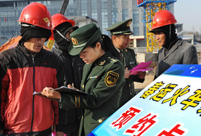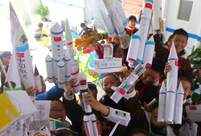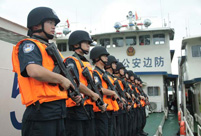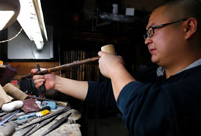 'Jin' named the word of the year by cross-strait netizens
'Jin' named the word of the year by cross-strait netizens Chinese scientific expedition goes to build new Antarctica station
Chinese scientific expedition goes to build new Antarctica station
 Chinese naval escort fleet conducts replenishment in Indian Ocean
Chinese naval escort fleet conducts replenishment in Indian Ocean 17th joint patrol of Mekong River to start
17th joint patrol of Mekong River to start China's moon rover, lander photograph each other
China's moon rover, lander photograph each other Teaming up against polluters
Teaming up against polluters
TRENTO, Italy, Dec. 24 -- Networking between cities will innovate Universiades and pave the way for possible collaboration between different countries, the President of the International University Sports Federation (FISU) Claude-Louis Gallien told Xinhua in a recent interview.
Gallien said he was fully satisfied with the Winter Universiade 2013 that ended last week in northern Italy's Trentino region, thanks to the good work behind, the snow and ice venues as well as the experience of professionals who are used to organize big events.
The next Winter Universiade will be held in Granada, Spain, which are expected to encounter some problems, said Gallien.
"We know that the next edition will be different and we expect to have some difficulties," he acknowledged. "But each Universiade is a specific case and we will be practical and flexible enough to manage with what we have."
Gallien noted that Spain has economic difficulties and Granada is in the south of the country, where the planning of winter sports is not so easy.
"We know already they will not be able to make the biathlon and cross country for some economical and ecological reasons," he said.
Therefore "what I would like to do with the Granada Universiade is try to innovate," Gallien stressed.
FISU has already enhanced a transfer of knowledge program after the 2011 Summer Universiade hosted in Shenzhen, China, which was "difficult to organize but then achieved a great success."
People from Shenzhen went to Kazan, Russia, which hosted the 27th Summer Universiade this year, to transmit their experience, while Kazan is now trying to transfer its knowledge to Gwangju, South Korea, that will host the 2015 Summer Universiade. The same happened for the winter events.
"Now we want to make one step more, and if there are some difficulties for Granada we want to be ready to say that not only there will be a transfer of knowledge, but also a network between the cities that organize the Universiade," Gallien said.
"Why, for example, not imagine that some events that cannot be organized in Granada could go back to Trentino?" he pointed out.
Thus the year 2015 could be the first time that different cities would be networking to organize a Universiade, which could be repeated in the next editions, also involving cities from different countries, Gallien highlighted.
"Maybe that Granada's will not be the greatest Universiade ever organized, but it could be the most innovative one. We are much more flexible than other organizations," he said.
The FISU president also noted "Universiades have never been so popular." Eurosport claimed viewing figures for Trentino 2013, which was the largest world winter multi-sport event this year, three-times those for the Kazan Universiade.
"We are very ambitious, and every time we want to make the best Universiade ever," Gallien went on saying. "Each Universiade can be unique and what we try to do is help different countries know how to build a sports event and communicate what is precious in them," he added.
The purpose of FISU, whose motto is "champions of today, leaders of tomorrow," is education, Gallien said. "We do not run after money or medals, we want to reinvest our money in our target, which is students," he added.
"We say in FISU the target is not the medals but the work, the efforts and the time you spend to have the best possible results. If you have the medals it is great, if you do not have the medals, just be sure you did your very best and then the medals will come one day or another," he stressed.
If sometimes the medals can be seen as a means of education, some other times "you can try to educate with other things than medals, for example involving citizens as volunteers to build the great event," Gallien said.
Public health must be the priority, the FISU president also stressed. "If you take your population to come to a better level of wellness every day, month and year, then you have educated it," he said.
For example, FISU launched the "Check your heart" program during the last Summer Universiade. All the student-athletes in Kazan were invited to go through an important examination.
"In the Universiade there are hundreds of student-athletes who come from countries where they never have a chance to be checked, and we discovered about 10 cases of students who should not be in the Universiade, because their heart was not in good conditions," Gallien said.
"Universiades are profoundly involved in health, they give medals but also some good advice," he said also launching the new idea that "maybe one day FISU will create a kind of health passport for the student-athletes."
 People prepare for upcoming 'Chunyun'
People prepare for upcoming 'Chunyun'  Highlights of Beijing int'l luxury show
Highlights of Beijing int'l luxury show Record of Chinese expressions in 2013
Record of Chinese expressions in 2013 China's moon rover, lander photograph each other
China's moon rover, lander photograph each other 17th joint patrol of Mekong River to start
17th joint patrol of Mekong River to start Spring City Kunming witnesses snowfall
Spring City Kunming witnesses snowfall Heritage of Jinghu, arts of strings
Heritage of Jinghu, arts of strings Weekly Sports Photos
Weekly Sports Photos PLA elite units unveiled
PLA elite units unveiled  China's stealth fighters hold drill over plateau
China's stealth fighters hold drill over plateau Chinese navy hospital ship's mission
Chinese navy hospital ship's mission  "Free lunch" program initiated in NW China
"Free lunch" program initiated in NW China  Rime scenery in Mount Huangshan
Rime scenery in Mount Huangshan DPRK's Kaesong Industrial Complex
DPRK's Kaesong Industrial Complex 'Jin' named the word of the year
'Jin' named the word of the year Day|Week|Month